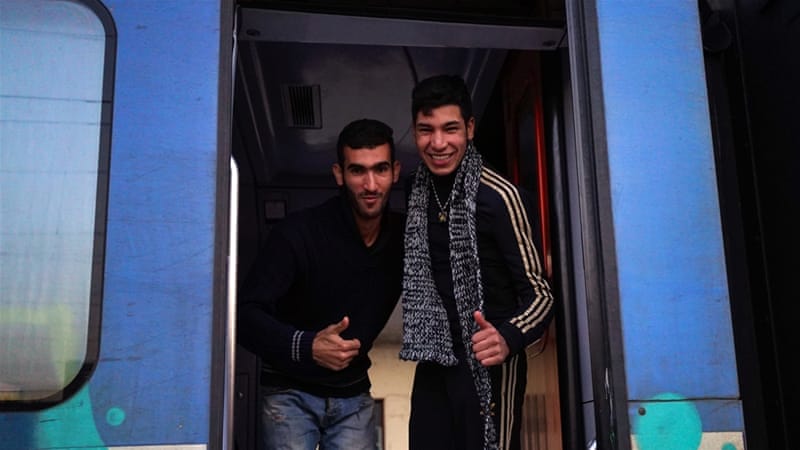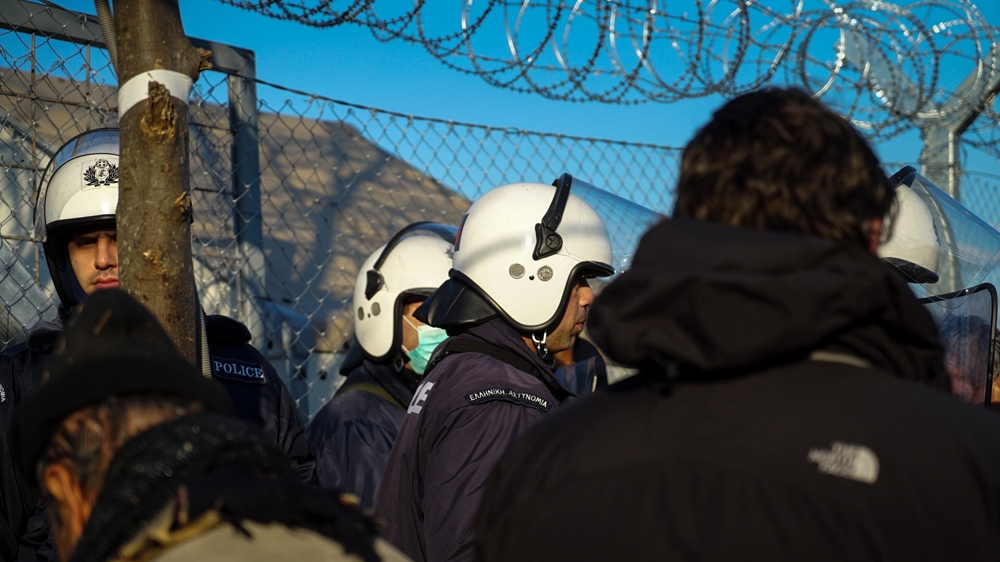As the sun gradually dimmed into night, 20-year-old Hamza Chimawi hung off the side of a train car with one arm and swung himself down to the platform at the Idomeni crossing on the border of Greece and Macedonia. 
Like thousands of other mostly young Moroccans, Hamza left his home town and took off for Europe. Lighting his cigarette and then another for his friend Mohamed, who is a year younger than him, he said that they risked their lives on boats and land to make it to any country in Europe.
“Anywhere, I’d go anywhere in Europe,” he told Al Jazeera just days before Greek police forcibly evicted thousands of stranded refugees and migrants from a makeshift camp on the Greek side of the border.
“I left Casablanca, left my family behind, my home,” he said, recalling taking a flimsy rubber dinghy with Syrians and Iraqis from Turkey to Greece.
“I want to live in dignity and respect like everyone else. Now we’re stuck [in Greece].”
Hamza and Mohamed are among more than 968,000 refugees and migrants who have arrived in Europe by boat this year, according to the United Nations human rights agency (UNHCR). At least 3,625 people have died at sea or still cannot be accounted for.
For Moroccans, like several other nationalities, the Macedonian border is sealed shut. Last month, Macedonian President Gjorge Ivanov announced that only Syrians, Iraqis and Afghans would be allowed to pass through his country en route to elsewhere in Europe.
Ivanov deemed potential asylum seekers from Morocco, Eritrea, Iran, Pakistan, Somalia and elsewhere as “economic migrants”, claiming that the presence of more than 2,000 refugees and migrants in Macedonia at any given time would result in “permanent and direct threats and risks for national security”.
Croatia, Slovenia and Serbia imposed similar restrictions, while Hungary shut its borders completely. The string of border closures across Eastern and Central Europe resulted in a massive build-up of refugees and migrants in Greece.
 |
| For Moroccans, like several other nationalities, the Macedonian border is sealed shut [Sorin Furcoi/Al Jazeera] |
‘No future’
Mohamed said he left Morocco because those like him “don’t have rights in Morocco. There is no future for young people. There is no work and no hope. We didn’t risk our lives for no reason”.
After sleeping for two weeks with three others in a tent made to fit two, Hamza and Mohamed left Idomeni the night before hundreds of heavily armed Greek police officers stormed the camp at dawn. They yanked people from their tents, pushing them and forcing them on to buses back to Athens.
Adnane Bennis, a political analyst and editor for Morocco World News website, explained that Moroccans have a long history of packing their bags for Europe. “People used to cross the sea to go to Spain. Now they saw an opportunity in Greece,” he told Al Jazeera, referring to the huge influx of refugees and migrants passing through that country.
According to statistics by the International Monetary Fund, the overall unemployment rate in Morocco “remained high” at 9.7 percent in 2014, while youth unemployment sat at 20 percent.
“In Morocco and in other Arab countries, providing employment for the hundreds of thousands of youth who enter the job market every year requires huge investments in education, infrastructure and vocational training,” Bennis said.
Driss Maghraoui, a politics professor at Al-Akhawayn University in Ifrane, Morocco, said that “the majority of people go for economic reasons”, but that “the idea of political rights is also there”.
A report published by Human Rights Watch (HRW) in November would suggest that there are ample political reasons, namely human rights violations, to accompany the economic drivers behind migration.
HRW accused the Moroccan monarchy and authorities of “barring international watchdogs, suppressing domestic dissent, and restricting free speech while maintaining a pro-democracy facade”.
 |
| ‘Why did I leave Morocco? No healthcare, no jobs, no studies, no housing’ [Sorin Furcoi/Al Jazeera] |
The more than 2,300 people who hadn’t already voluntarily left the Macedonian border were placed in three former Olympic Games’ stadiums which have been turned into government-run refugee facilities.
Mahmoud, 28, left Casablanca more than a month ago. He recalled thinking he had made it when he and 70 other Syrians and Moroccans landed on the shores of Lesbos in a dinghy boat. “I thought we were finally safe,” he told Al Jazeera. “We survived the water and the armed smugglers.”
He camped on Lesbos for two days while he waited for friends to make it to the island. Once reunited, they took a ferry to mainland Greece and got on the first bus to the Macedonian border. But it was only upon arriving in Idomeni that Mahmoud learned Moroccans, like so many others, were blocked from passing.
Still hoping to make it through and head to Italy, where he would live with his older brother and study, Mahmoud camped in Idomeni for 20 days.
“It was very cold outside and the tents kept filling up with smoke because people were burning fires,” he remembered. “It rained for a few days – that’s when I got sick.”
He left Morocco because there was “no healthcare, no jobs, no studies, no housing,” he said. “I want to get married and raise a family one day, and that seems impossible in Morocco.”
Saying that Syrians, Iraqis and Afghans should be given priority, Mahmoud added: “Moroccans should still be allowed to go to Europe. People die from war, but they also die slowly without work or food.” He is now waiting in limbo with more than 1,000 others in the Olympic Games’ Taekwondo stadium on the outskirts of Athens.
Speaking to Al Jazeera, local municipal staff admitted that the facilities were only meant to house up to 300 people during emergency situations.
 |
| ‘This is a structural issue that involves the way Europe deals with Africa and other parts of the world’ [Sorin Furcoi/Al Jazeera] |
Explaining that European policies play a role in creating the conditions under which Moroccans leave, Maghraoui said: “This is a structural issue that involves the way Europe deals with Africa and other parts of the world.
“The IMF and World Bank policies encouraged [in Morocco] do not benefit the vast majority of people. Unless the policy-makers realise that this is the result of most of their rampant neoliberal policies, there will be more migration and more and more problems as a result.”
Back in Athens, 23-year-old Ali waited outside in a queue of hundreds waiting for food. Speaking to Al Jazeera, he decried moves to prevent Moroccans and others from reaching Europe.
“What is the point in not letting us pass? No one from Macedonia came and asked where we are heading or why we need to get there. They just said no.”
Declining to elaborate, he said: “We have legitimate reasons for leaving. Our government steals from us, and the law is only enforced on the poor.”
Inside the Taekwondo stadium, blankets and clothes were spread out across the cold concrete floor because Greek authorities did not provide mattresses or cots.
Hussam, 20, complained of the dirty water leaking from the bathrooms into the hallways where families slept. “This is filthy. This place isn’t humane,” he told Al Jazeera as he walked through the stadium and pointed out large piles of rubbish.
“The trash, the trash… I’m suffocating from the trash. I sleep and there’s trash next to my head; I sleep and there’s trash in front of me. Shame. Shame.”
The oldest brother in his family, Hussam left his mother and siblings behind in Marrakesh with hopes of being able to find a job and send money back to support them. “Now we’re stuck here like animals. I don’t have money to eat, let alone send home.”
 |
| ‘Now we’re stuck here like animals. I don’t have money to eat, let alone send home’ [Sorin Furcoi/Al Jazeera] |































